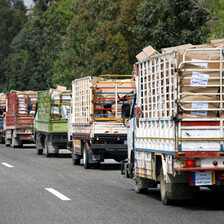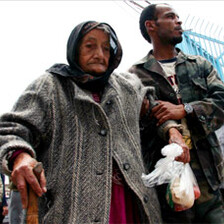Electronic Lebanon 28 May 2007
BEIRUT, 28 May 2007 (IRIN) - Heavy overnight bombardment on Friday of the Nahr al-Bared refugee camp by the Lebanese army killed at least four civilians and injured dozens, with eye-witnesses describing scenes of devastation after the military’s week-long clashes with Islamist militants in the once densely populated camp.
“Nahr al-Bared looks like Leningrad,” Bilal Aslan, a commander in the military wing of the secular Palestinian faction Fatah, who has spent the week inside the camp, told IRIN, referring to the German World War II siege of the Russian city.
“The army is not letting anyone in here, so no one can see the massacres they have committed,” he said.
Khaled al-Haj, service officer of Nahr al-Bared for the UN Palestinian relief organisation, UNRWA, who spent the first four days of the siege inside the camp, told IRIN: “We’ve had no electricity, no water and no food. Large areas of the camp are completely destroyed. Nahr al-Bared is a ghost town. The only thing you can smell is death.”
Death toll
According to figures from Fatah and other community leaders inside the camp, over 100 wounded civilians remain trapped in the camp, with at least 10 severely injured.
As the crisis enters its second week, obtaining exact figures on the death toll and injuries from the violence remain problematic. Major news wires report that 20 civilians, 30 Lebanese soldiers and up to 60 militants have been killed. Fatah al-Islam has claimed only 10 of its fighters have been killed.
Figures from the Palestine Red Crescent (PRC), the only emergency service running ambulances in and out of the camp, at the end of Friday said 84 civilians had been wounded and 35 killed since the bombardment of the camp began on 20 May.
Three big explosions in and around Beirut over the last week killed one woman and wounded nearly 30 other people.
Saudi ambassador to Lebanon, Abdul Aziz Khoja, in an interview with Al Hayat published on Sunday, said four Saudi militants fighting for Fatah al-Islam had been confirmed dead. Fatah al-Islam is believed to have several hundred fighters from Algeria, Lebanon, Syria and Yemen as well as disaffected youth from the Palestinian community.
Houses, mosques destroyed
Over 200 houses in the camp have been totally destroyed, according to Abu Jaber, a community leader working inside the camp, while five mosques have been destroyed by tank and artillery fire. The army said it has been targeting Fatah al-Islam positions. The most recently struck mosque, Al Hawouz near the once bustling central market place of the camp, used to house a temporary clinic set up by the PRC but it was soon abandoned.
“The first shell came through the roof. It was dark and dusty and everyone was screaming. My cousin’s eight-month-old daughter fainted from fear,” said Hafida Deeb Wehbe, describing the bombardment that began around 8pm on Friday. “The second and third rounds landed in the street, and then the fourth hit the dome of the mosque and totally destroyed it.”
With none of the camp’s five regular clinics now operating the PRC is setting up two temporary tented clinics, said Dr Abdel Aziz of the Safad PRC-run hospital in neighbouring Beddawi camp.
Dr Aziz warned of further casualties if the army makes good on its threat to enter the camp.
Seven months pregnant mother of three Rweida Awad fled Nahr al-Bared for Beddawi camp, 10km away, on Wednesday with her husband Ibrahim Jundi. Her two 18-month-old twins, Waleed and Jinam, had been sick with chest infections and fever before the bombardment of the camp began.
“The twins were screaming all through the night and holding my hand. We left their medicine behind and they have had no milk for days,” said Rweida, who is concerned she may suffer a miscarriage from stress.
A source in the Ministry of Defence, speaking on condition of anonymity, admitted the army was aware “lots of civilians have died” but repeated an earlier statement insisting the army only targeted suspected Fatah al-Islam positions.
Defiant
A group calling itself Al-Qaeda’s Wing in the Levant vowed to carry out bombings in Lebanon and attacks on Christians unless Beirut pulled its army from Palestinian refugee camps.
“We warn you for the last time, after which there will be nothing apart from seas of blood,” said a speaker identified as the military leader of the group in a video posted on Friday by a media arm used by Islamist groups, including Al-Qaeda in Iraq.
In a speech on Friday Hassan Nasrallah, leader of Hezbollah, the Lebanese Shia militant organisation which has spearheaded a six month campaign to bring down Lebanon’s government, warned the government against sending the army into Nahr al-Bared, insisting on a negotiated political solution.
But Abu Saleem Taha, the spokesman for Fatah al-Islam contacted by IRIN on Saturday, said his group was still strong and was ready to fight to the death.
“Fatah al-Islam is ready to take this battle all over Lebanon. We will not surrender and we prefer to fight and die serving God. This battle is only just beginning.”
A tense calm hung over the camp after the bombardment as the government urged Palestinian leaders in Lebanon to decide on a unified response to the crisis, sparked last Sunday when Fatah militants killed 23 Lebanese soldiers in retaliation for the attempted arrest of people suspected of robbing a bank in Tripoli.
This item comes to you via IRIN, a UN humanitarian news and information service, but may not necessarily reflect the views of the United Nations or its agencies. All IRIN material may be reposted or reprinted free-of-charge; refer to the copyright page for conditions of use. IRIN is a project of the UN Office for the Coordination of Humanitarian Affairs.
Related Links


